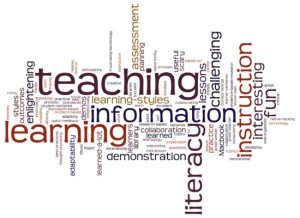 Every May, one week is designated as Teacher Appreciation Week. There will be the customary newspaper coverage of favorite teacher stories, the hashtag #thankateacher will trend on Twitter, and celebrities will post videos thanking teachers as the most important influences in their lives. These are all wonderful and appropriate tributes to the profession that prepares our nation’s youth to become productive citizens.
Every May, one week is designated as Teacher Appreciation Week. There will be the customary newspaper coverage of favorite teacher stories, the hashtag #thankateacher will trend on Twitter, and celebrities will post videos thanking teachers as the most important influences in their lives. These are all wonderful and appropriate tributes to the profession that prepares our nation’s youth to become productive citizens.
But for the other 51 weeks of the year, the teaching profession is struggling under serious criticism. According to the National Education Association (NEA) website:
- There are 3,232,813 teachers in K-12 public schools, and about 16 percent of these positions become vacant each year.
- Forty-five percent of new teachers abandon the profession in their first five years.
- More teachers believe collaborating with colleagues is essential to their work, but many districts still don’t provide time for teachers to learn, share and collaborate.
- Teachers’ salaries still lag behind those for other occupations requiring a college degree, and the pay gap is growing larger.
The teaching profession dedicated to educating the nation has done a terrible job at educating the nation about the importance of teaching. Teachers today have failed to educate the public about the value of this great vocation in the same manner that they failed to teach the value of teaching to previous generations, most notably the parents and grandparents of students in schools today.
Now there is increasing negative political attention turned on the teaching profession. For example, in-between statements of support for teachers, New Jersey Governor Chris Christie was quoted as saying, “They [fusion_builder_container hundred_percent=”yes” overflow=”visible”][fusion_builder_row][fusion_builder_column type=”1_1″ background_position=”left top” background_color=”” border_size=”” border_color=”” border_style=”solid” spacing=”yes” background_image=”” background_repeat=”no-repeat” padding=”” margin_top=”0px” margin_bottom=”0px” class=”” id=”” animation_type=”” animation_speed=”0.3″ animation_direction=”left” hide_on_mobile=”no” center_content=”no” min_height=”none”][teachers] only work 180 days,” voicing the popular perception that teachers work only part time.
Of course, there is evidence that counter his claims that teachers do not work that hard; the Wall Street Journal listed a series of facts about the teaching profession in the June 2011 article, Number of the Week: U.S. Teachers’ Hours Among World’s Longest:
- U.S. educators work 1,097 hours teaching in the classroom, the most of any industrialized nation measured by the Organization for Economic Cooperation and Development.
- American teachers work 1,913 hours a year, just shy of the U.S. average of 1,932 per year.
- U.S. teachers are slightly more likely to work at home than private-sector workers, the U.S. Labor Department found. They aren’t paid to work weekends but are as likely to do so as private-sector employees — including those scheduled to work Saturdays and Sundays.
The irony is that for years teachers have not been effective advocates for their work. These same teachers have logged countless hours of instruction in a myriad of disciplines, but they not taught their students how rigorous teaching is as a job. Teachers are often so overwhelmed or so marginalized that they have little to no time to address criticism. The result is that the very public that teachers need to enlist in support of the teaching profession is not informed how best to respond to the criticisms being leveled at educators today.
Additionally, there is the counter-productive notion that the experience of being a student qualifies one to speak on behalf of the entire education profession. Certainly, all occupations have practitioners that can make work look easy to an uninformed public. Any product- a building, a meal, a vaccine, a championship trophy -cannot fully inform the public of the individual or collaborative preparation to make that product a reality. The same can be said for a service industry; a public demands highly skilled doctors, lawyers, police officers, architects.
Creating highly skilled teachers is a long and arduous process. Teachers study their craft first at college and later implement these lessons in classrooms. Teachers must continue professional development since most states have a requirement for a master’s degree within a legislated period of time. Experience, however, is the best way to measure success, and as a general rule, a minimum of three years in necessary to fully understand and implement a curriculum in any subject area. However, today’s classroom is more often a crucible, a brutal training ground that disputes the notion that “anyone can teach” as almost half the nation’s new teachers vote for the profession with their feet, leaving within the first five years.
For decades, K-12 teachers have collectively prepared students for careers in the sciences, in mathematics, in the arts, in the humanities, and in the industrial arts. Consider how little students today understand about how much time and cognitive effort a teacher has to expend for each lesson plan. Day after day, period after period, students participate in an academic enterprise without acknowledging the multiple components that teachers have included in its construction: IEPs, multiple/emotional intelligence strategies, Bloom’s levels of understanding, technology, curriculum content, available resources and facility limitations to name a few.
Teaching is challenging work, and in their commitment to provide the nation with all manner of numeracy and literacy skills, teachers have failed to express to their students the complications of teaching. Students and their parents at all grade levels in public or private schools today have little understanding of the increasing demands of the teaching profession which now include incorporating Common Core State Standards, integrating technology for 21st Century Skills, and increasing scrutiny in newly designed evaluations. Ultimately, teachers have failed to communicate the significance of their contributions to a productive society that will result in recruiting the best and the brightest to the profession.
The public’s understanding of education often comes as a “recipient in the desk ” point of view, not from the perspective of the teacher charged with engaging and educating every student. Unless the public is persuaded that teachers are critical for our democratic society, the profession will continue to suffer economically and socially. How ironic that along with all those lessons on reading and writing and arithmetic, teachers should have been teaching the importance of teaching.
[/fusion_builder_column][/fusion_builder_row][/fusion_builder_container]





